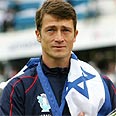

On Saturday night, the day before the pole-vaulting competition in the European championship in Munich in 2002, we went out on a tour of the notorious Connelly Street in the Olympic village. Exactly 30 years have passed since the massacre of the Israeli delegation in one of the street's lodges.
We tried to imagine and to reconstruct with a close-up how the terrorists succeeded in arriving, penetrating and minimizing the grandness and replacing it with the biggest ever Olympic tragedy. Eleven of the delegates returned to Israel in coffins.
The truth is that we did not expect this chilling visit, this almost necessary visit, to simply serve as a journal for the events that would occur the next day. On Saturday, less than 24 hours after the visit, Alex Averbukh, the new immigrant from Siberia competed in the final pole-vaulting competition. We have never had an athlete on his level, but during those months he was on leave due to an injury. All the commentators betted on Tim Lobinger, the German pole-vaulting star, with ratings in the media.
That morning I spoke with Sergey Bubka, the world champion and the legendary pole-vaulter from the Ukraine, who is presently a senior member of the World Athletic Association. He said that "Averbukh has a good chance." I thought to myself: Words don't ensure anything, even if they are spoken by the iconic pole-vaulter Bubka.
In the evening, I experienced my most Israeli moment. If you will, the moment that made sports a lot more than a mere competition. Nothing could be more symbolic.
Take for example the competition's location: Exactly one kilometer (about half a mile) away from the terrible lodge on Connelly Street. Take the competition's timing: Exactly 30 years after the Munich massacre. Take his main opponents: Germans. Take the Israeli subject: A man who immigrated to Israel only three years prior.
Without contest the most Israeli moment
This was a very dramatic competition. Alex showed that despite his injury he was prepared to give it his all. An excellent vault in an attempt to reach a height of 5.85 meters (19 feet), ended the story. I had been at hundreds of international sporting events – but I had never been so excited.Just an hour later, there was a press conference with the three medal-winners. The press conference took place in the exact room where the winners in the terror Olympics were interviewed. That is also symbolic, isn't it?
Alex, who was born two years after the Munich massacre, reacted to the flood of questions. The medal-winning Germans asked to leave the event. "They are only asking Averbukh, we have nothing to do here," said the frustrated Lobinger. Not only did he lose, but he was also pushed aside by the press.
Later, tens of thousands stood at the Olympic stadium in Munich, the same stadium as in 1972 and heard the sounds of Hatikva. Alex was placed on podium number one and the gold medal hung around his neck; he wrapped himself with the Israeli flag and shed a tear. So did I.
I looked at Levy Pasevkin, the former athlete who has been focusing on bringing Jewish athletes around the world to Israel, including Averbukh, and the two of us wiped our tearing eyes. We thought again about the amazing coincidence: A new immigrant wrapped in the Israeli flag, wearing the gold medal around his neck on Munich's soil, exactly 30 years later. There have been many Israeli moments, but this was without contest the most Israeli moment.















